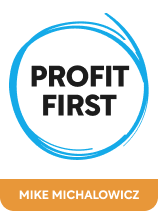

This article is an excerpt from the Shortform book guide to "Profit First" by Mike Michalowicz. Shortform has the world's best summaries and analyses of books you should be reading.
Like this article? Sign up for a free trial here .
What is the Profit First method? In what way is the Profit First accounting system superior to traditional methods?
Mike Michalowicz, a business makeover specialist and entrepreneur, believes that traditional accounting methods often fail in the long term because they prioritize the wrong things. The Profit First method is Michalowicz’s alternative to traditional business accounting.
In this article, we’ll explore the main principles of traditional accounting, Michalowicz’s argument for why they don’t work, and the main tenets of his Profit First accounting method.
Traditional Business Accounting
First, let’s clarify what Michalowicz is referring to when he talks about traditional accounting. Specifically, he’s referring to three main principles in his arguments, which he claims are the common wisdom of the business world.
- Traditional business accounting recommends starting with income, subtracting all expenses, and labeling the difference as profit.
- Constantly look to grow your business and put growth as your first priority. Growth leads to an increase in your income as well as the overall value of your company in case another company wants to buy it.
- Traditional accounting also advises that you consult financial documents like balance sheets or income statements regularly, so you know what’s going on financially in your business at all times.
The Danger of Traditional Accounting
While traditional principles work for some, they also lead many businesses to failure. Michalowicz argues that this high failure rate exists because traditional accounting principles clash with the way most people think and make decisions.
(Shortform note: Research supports Michalowicz’s claim that traditional accounting methods can clash with the way people think. A study revealed that even professional accountants still allow some of their personal, unconscious bias to get in the way of their logical, rational accounting work, often turning out inaccurate results that favor their clients.)
Michalowicz identifies one major clash in particular: Entrepreneurs interpret the traditional principle that growth is success to mean they should reinvest all their money—including their profits and personal funds—back into their expenses. They think that this increase in expenses will be covered by the increased income from their larger business. However, reinvestment into growth makes a business unstable, as it creates high costs and eliminates cash on hand. This instability can make slow sales periods fatal for a business.
(Shortform note: Behavioral psychology studies on gambling support Michalowicz’s claim that people naturally think continuing to put money into their business will eventually result in success. Studies suggest that while gambling, losing money makes us want to spend again, and makes us think that doing so will earn us rewards. This research could be interpreted to suggest that if entrepreneurs are losing money growing their business, they will psychologically want to spend more money on growth to chase success.)
Challenges in Addressing Instability
The instability that comes from a rapidly growing business is also very difficult for most entrepreneurs to fix, says Michalowicz. He outlines three additional ways traditional principles clash with natural decision making and explains how these clashes prevent entrepreneurs from stabilizing their businesses.
1) Many entrepreneurs become used to the extra expenses they reinvested their profits on, and don’t want to get rid of them. They might have a hard time recognizing that they don’t need the company car or office space they have grown accustomed to, for example. (Shortform note: Research on compulsive spenders supports Michalowicz’s argument that people attach emotions to the things they buy, which makes cutting expenses much more difficult. Studies suggest that people tend to believe that buying things will make them happier, or compulsively buy as a way to try and cope with shame.)
2) Financial documents are often complex and difficult to navigate, even for accountants. This can make it difficult for entrepreneurs to even recognize when their business is financially unstable. (Shortform note: Michalowicz’s claim that small business entrepreneurs have trouble understanding their accounting is backed up by a recent survey, which found that 40 percent of small business owners would label themselves financially illiterate, and 66 percent wish they knew more about their finances.)
3) Financial instability and uncertainty often lead entrepreneurs to make irrational or panicked decisions, which only put a business into further trouble. Often, these decisions involve looking for increased growth and sales even if they come with expenses or opportunity costs. (Shortform note: Psychological research supports Michalowicz’s claim that as people lose money, they will make worse financial decisions. A study found that as gamblers lost money, they would be more likely to recklessly and impulsively spend more, believing that doing so would earn them money back. The study suggests that this is because losing money is an emotional event, and so it doesn’t encourage rational decision making.)
Core Tenets of the Profit First Method
Now that we’ve shown how traditional accounting clashes with normal thinking and decision-making, we’ll outline Michalowicz’s accounting system: the Profit First method.
What is the Profit First method? In this system, a percentage of income is taken as profit before any expenses are paid. The Profit First method works on four main tenets, which allow an entrepreneur to avoid the challenges of traditional accounting by using the natural way they think to make healthy financial decisions.
Tenet #1: Limit Your Resources
Michalowicz’s first tenet is to allocate a specific percentage of your income for expenses (we’ll discuss how to do this later on). By allocating only a percentage of your income to expenses, you’ll force yourself to spend that money more efficiently. That’s because of Parkinson’s Law: the theory that the more resources we have available, the more resources we will use. This theory works the other way as well: the fewer resources we have available, the fewer we’ll need to use.
(Shortform note: Michalowicz’s definition of Parkinson’s law isn’t quite accurate. Instead, it’s a common misinterpretation of an essay on government bureaucracy published by historian and author Cyril Northcote Parkinson. What Michalowicz (and many others) calls Parkinson’s law is actually just the article’s first sentence, which describes the “commonplace observation” that people use all available time to complete work. Parkinson’s actual law is an equation explained later in the article, which tries to predict bureaucratic growth. Because of this misinterpretation, keep in mind moving forward that this first tenet is founded not on behavioral psychology, but rather on a common-sense principle.)
Tenet #2: Order in Terms of Importance
The next tenet Michalowicz outlines is to allocate your income in order of importance, starting with profit to emphasize that it’s your first priority. This works due to what psychology calls the primacy effect: When given multiple pieces of information, our natural tendency is to better remember and place more importance on the first one given to us.
(Shortform note: Michalowicz claims that you’ll place the most focus and importance on whatever comes first. However, behavioral psychology suggests several other factors which might cause us to place more focus elsewhere in a list. Besides the primacy effect Michalowicz cites, there’s also the recency effect, which says that we’ll better remember and focus more on information given to us most recently. Also, there’s evidence that an item in a list emphasized more than others might also be better remembered, no matter where it is in the list.)
Tenet #3: Removing Temptation
For the third tenet, Michalowicz advises that you remove the temptation to reinvest money into growth by creating savings accounts for profit and other essentials, and making those accounts inconvenient to access. By making that money harder to access, you’ll be less tempted to misuse it. (Shortform note: Michalowicz’s suggestion of changing your circumstances to avoid temptation may raise questions, as most people tend to think about temptation as an internal struggle to maintain our willpower. However, studies show that changes in external circumstances can be an easier and more effective way to increase self-control, supporting Michalowicz’s tenet.)
Tenet #4: Keep Good Habits
Finally, Michalowicz’s fourth tenet is to make a habit of dividing your income between profit and expenses and paying your bills consistently. By making a habit of dividing income amongst your business’s bank accounts, you can recognize financial changes just by looking at their account balances. Then, you can react to those changes calmly because you’ll have seen them coming.
(Shortform note: You might be wondering how good habits will help you react calmly to change. According to Chip and Dan Heath in The Power of Moments, habits help us stay calm because they help us prepare responses to change ahead of time. These prepared responses mean that when change does occur, we’ll respond more calmly because we’ll have already decided how to do so in advance and so won’t be caught by surprise.)

———End of Preview———
Like what you just read? Read the rest of the world's best book summary and analysis of Mike Michalowicz's "Profit First" at Shortform .
Here's what you'll find in our full Profit First summary :
- Why traditional business accounting methods don't work
- How to use the Profit First method to increase your business’s profitability and stability
- How to assess your business's current financial health






